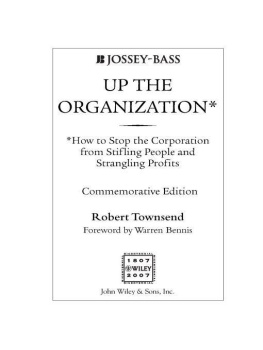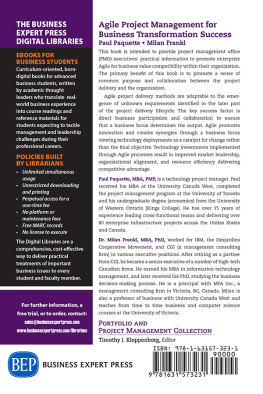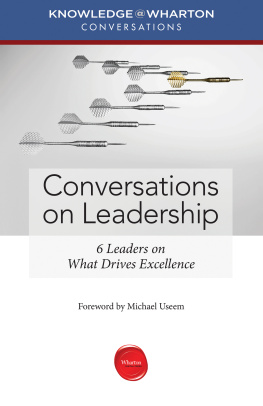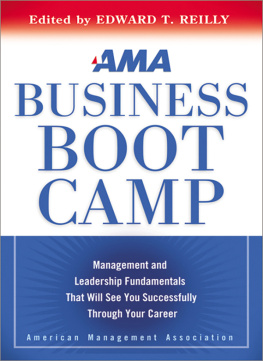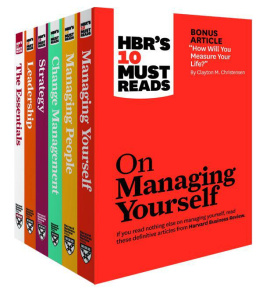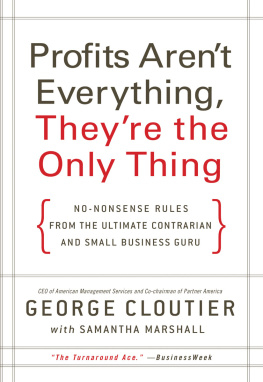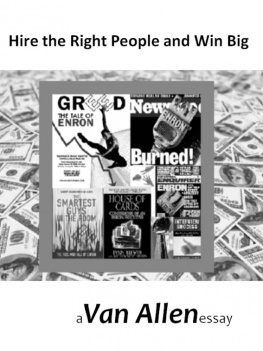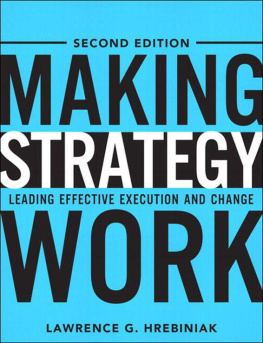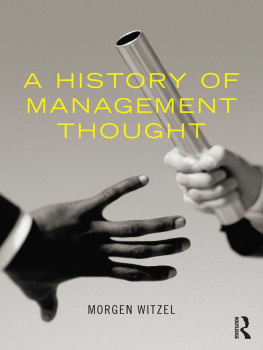Table of Contents
Copyright 2007 by the Townsend Family Trust. All rights reserved.
Published by Jossey-Bass
A Wiley Imprint
989 Market Street, San Francisco, CA 94103-1741 www.josseybass.com
Wiley Bicentennial logo: Richard J. Pacifico
No part of this publication may be reproduced, stored in a retrieval system, or transmitted in any form or by any means, electronic, mechanical, photocopying, recording, scanning, or otherwise, except as permitted under Section 107 or 108 of the 1976 United States Copyright Act, without either the prior written permission of the publisher, or authorization through payment of the appropriate per-copy fee to the Copyright Clearance Center, Inc., 222 Rosewood Drive, Danvers, MA 01923, 978-750-8400, fax 978-646-8600, or on the Web at www.copyright.com. Requests to the publisher for permission should be addressed to the Permissions Department,John Wiley & Sons, Inc., 111 River Street, Hoboken, NJ 07030, 201-748-6011, fax 201-748-6008, or online at www.wiley.com/go/permissions.
Limit of Liability/Disclaimer of Warranty: While the publisher and author have used their best efforts in preparing this book, they make no representations or warranties with respect to the accuracy or completeness of the contents of this book and specifically disclaim any implied warranties of merchantability or fitness for a particular purpose. No warranty may be created or extended by sales representatives or written sales materials. The advice and strategies contained herein may not be suitable for your situation.You should consult with a professional where appropriate. Neither the publisher nor author shall be liable for any loss of profit or any other commercial damages, including but not limited to special, incidental, consequential, or other damages.
Jossey-Bass books and products are available through most bookstores.To contact Jossey-Bass directly call our Customer Care Department within the U.S. at 800-956-7739, outside the U.S. at 317-572-3986, or fax 317-572-4002.
Jossey-Bass also publishes its books in a variety of electronic formats. Some content that appears in print may not be available in electronic books.
The chapter titled Further Up the Organization was originally published in the July 1970 issue of Playboy.
Library of Congress Cataloging-in-Publication Data
Townsend, Robert, 1920-1998
Up the organization : how to stop the corporation from stifling people and strangling profits / Robert Townsend ; foreword by Warren Bennis.Commemorative ed.
p. cm.
ISBN 978-0-7879-8775-6 (cloth)
1. Management. I. Title.
HD31.T67 2007
658dc22
2007007195
HB Printing
A WARREN BENNIS BOOK
This collection of books is devoted exclusively to new and exemplary contributions to management thought and practice. The books in this series are addressed to thoughtful leaders, executives, and managers of all organizations who are struggling with and committed to responsible change. My hope and goal is to spark new intellectual capital by sharing ideas positioned at an angle to conventional thoughtin short, to publish books that disturb the present in the service of a better future.
BOOKS IN THE WARREN BENNIS SIGNATURE SERIES
| Branden | Self-Esteem at Work |
| Mitroff, Denton | A Spiritual Audit of Corporate America |
| Schein | The Corporate Culture Survival Guide |
| Sample | The Contrarians Guide to Leadership |
| Lawrence, Nohria | Driven |
| Cloke, Goldsmith | The End of Management and the Rise of Organizational Democracy |
| Glen | Leading Geeks |
| Cloke, Goldsmith | The Art of Waking People Up |
| George | Authentic Leadership |
| Kohlrieser | Hostage at the Table |
| Rhode | Moral Leadership |
| George | True North |
FOREWORD
Where Have You Gone, Joe DiMaggio?
It was sometime in 1967 when I was teaching at MIT, and my office phone rang. It was Bob Townsend. Not his secretary, mind you, but the real Bob Townsend. He was already known as something of a CEO icon(oclast), having revived a moribund car rental business, Avis, with the audacity of a kid with a spray can looking for trouble. Hed already taken his famous jab at the #1 Hertz with the killer commercial, WERE ONLY #2, BUT WE TRY HARDER. He had just resigned and wondered if he should write a book based on his Avis experience. He didnt read business books, he told me; he thought they were written by monastic types who had never experienced the smoky complexity of real work, who might not even know how to start a car, let alone lead people.The only exception, he told me, was my late mentor, Doug McGregor, who had written an extraordinarily influential book, The Human Side of Enterprise , which shaped the foundation of the field nowadays referred to as organizational behavior (OB). He had also heard that Doug insisted that all of his Ph.D. students work every summer for a bluecollar manufacturing company. (I spent two summers at Dewey & Almy, a pesticide company in nearby Lexington.) Thats why Bob Townsend was calling meto learn more about McGregor and his ideas.
Bob asked if he could come to Boston sometime to talk. When do you have time? I said, Now. He knocked on the front door of my house that same afternoon, a Friday, and stayed the weekend. He was captivated by McGregors famous categorization of human nature, for which he coined the terms Theory Y and Theory X. Perhaps overly simple? Bob didnt think so, nor did I.The two philosophies of leadership, almost Manichaean in their dichotomous assumptions and metaphysics, are still evident today, despite Dougs encouraging optimism:
The ancient conception that people do the work of the world only if they are forced to do so by threats or intimidation, or by the camouflaged authoritarian methods of paternalism, has been suffering from a lingering fatal illness for a quarter of a century. I venture to guess that it will be dead in another decade. ( The Professional Manager, edited by W. Bennis and C. McGregor, McGraw-Hill, 1968)
In this book, Townsend translates Theory X based on three (dubious) propositions:
People hate to work.
They have to be driven and threatened with punishment to get them to toward organizational objectives.
They like security, arent ambitious, want to be told what to do, dislike responsibility.
Townsends rendition of Theory Y is based on three quite different propositions:
People dont hate work. Its as natural as rest or play.
They dont have to be forced or threatened. If they commit themselves to mutual objectives, theyll drive themselves more effectively than you can drive them.
But theyll commit themselves only to the extent they can see ways of satisfying their ego and development needs.
Before I wrote this Foreword, I played a little game. I put the book in the palm of my right hand and stroked the edge of pages from back to front. I then stopped at random and wrote down the lead or other sentences that caught my eye. Here are a few examples:
page xxvi: Big successful institutions arent successful because of the way they operate, but in spite of it. They didnt get to the top doing things the way theyre doing them now.

